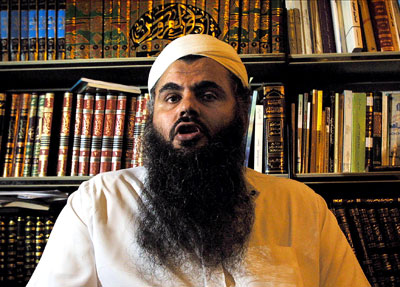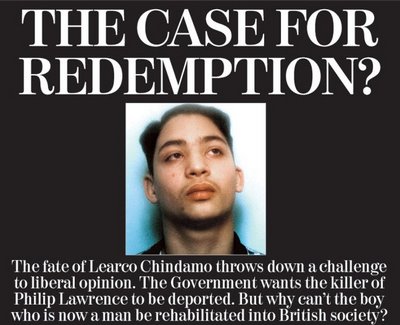Can you get much more hypocritical than the Daily Mail? Today, a day late after the Sun had already splashed on it:

And part of the Mail's front page the day after the ruling that Learco Chindamo could not be deported back to Italy:
 The Mail of course doesn't want malingering criminals to be sent back here, but it's perfectly OK with those who have served their time and have shown such a willingness to reform that the prison governor himself spoke out in his favour to be sent back to their "home" country, even if like Raymond Horne here and Learco Chindamo would be in Italy, they would be without any family, place to go or even any sort of connection to a country which they left when they were small children.
The Mail of course doesn't want malingering criminals to be sent back here, but it's perfectly OK with those who have served their time and have shown such a willingness to reform that the prison governor himself spoke out in his favour to be sent back to their "home" country, even if like Raymond Horne here and Learco Chindamo would be in Italy, they would be without any family, place to go or even any sort of connection to a country which they left when they were small children.
The Sun however is determined to make as much out of the comparison with Chindamo at it possibly can, even though it too is outraged by Horne's deportation. In a sidebar of its Horne story:
RARELY has there been a clearer case of double standards. Britain has been forced this week to accept sick paedophile Raymond Horne after he was flung out of Australia.
But only last year, our attempts to deport the Italian-born killer of headteacher Philip Lawrence — Learco Chindamo — ended in failure.
Horne moved to Australia when he was five and has lived there for 56 years. But because he is a British citizen — and because Australia isn’t tied up in EU regulations — lawyers say we have to take him back.
Chindamo was born in Italy and moved to Britain when he was six. Just nine years later, in 1995, he brutally killed Mr Lawrence.
Yet the Asylum and Immigration Tribunal threw out the bid to deport him to Italy last August as it would infringe his Human Right to have a family life, and breach EU directives that he can’t go unless he threatens the “fundamental interests of society”.
So we are powerless. And both are now free to roam our streets.
Well no, it's not double standards. Our courts have it right and Australia has it wrong - it is monstrous to send someone back to a country which they have no links to, especially when it's the country both have grown up in that has shaped the individual. If someone comes here as an adult and commits a crime then they should be deported unless there are pressing reasons as to why they should not - more on this in a moment. Horne is not our responsibility, just as Chindamo is. The Sun has also typically got it the wrong way round, wilfully, no doubt - it was the EU directive that meant he couldn't be deported, as he had been here for over 10 years. Only if that existed would the human rights act have came into play, as the judge who decided the Home Office's appeal made clear. Also, Chindamo is as far as I'm aware yet to be released, so he's not free at all.
The Sun's article on Horne himself is close to hysterical:
EVIL Raymond Horne last night settled in to his cushy new life in Britain — funded by hard-up taxpayers.
The 61-year-old fiend — dumped on us by Australia — will enjoy a free home, protection and benefits.
But police security and surveillance of him will cost taxpayers as much as £100,000 a year.
I'd say that presumably then the Sun would prefer that he wasn't monitored - but that would be a straw man, and that after all, is what the Sun relies on. The most likely place he'll be sent first of all is to a hostel, not a house, and far from being "protected", which he wouldn't need anyway if the Sun and Mail weren't plastering him all over the newspapers, he's going to be under the supervision of MAPPA, as the Sun article later admits. This doesn't however stop them from already imagining how he'll be spending his spare time:
He is even effectively free to stalk playgrounds or schools — and cannot be stopped from living near young families — because he did not serve time for his vile crimes in Britain.
Yeah, and he'll probably alternate when he isn't doing those two things with masturbating at the sight of children walking down the street and stroking a white cat sitting on his lap. Not to get too sidetracked, but Lorraine Kelly's been thinking up what Horne's going to immediately start doing as well:
But you know as well as I do that he will disappear into the undergrowth and be just one of thousands of grubby perverts who get away with child abuse and child rape, and allow sick child pornography to flourish.
Oh yes, there are tens of thousands of individuals out there who get away with child abuse and child rape. Memo to Ms Kelly: the vast, vast majority of child abuse and rape occurs within the family, which Horne doesn't have here, and child rape by a stranger is about a rare a crime as there is. When it does occur, it tends to be other children raping those within their own age group, not older men or those like Horne. Instead we're so terrified of paedophiles, as a direct result of the scaremongering and out of all proportion reporting on the matter by the Sun that we have schools that think they need to cover up children's faces when they put their images on the net. Then the likes of the Mail and Scum blame it on "political correctness", a PC-concept that they and they only created.
Back to the main article, although the whole of Kelly's excretion is appalling:
Last night the Ministry of Justice confirmed that unlike with freed UK prisoners, the police currently have no powers to exclude him from approaching schools and playgrounds.
A spokeswoman said: “Normally when sex offenders are released, they are on licence and can have conditions attached to this, such as to live in a certain address or be banned from certain areas.
“In a situation where a sex offender returns from a foreign country, this does not exist.”
In extreme cases cops can apply for a Sexual Offences Prevention Order that gives them the power to rein in offenders. But Scotland Yard declined to say if they had applied for the order for Horne.
Yes, but as the rather more measured Grauniad article points out, he has had to sign the sex offenders' register, meaning he has to abide by the conditions of that, which in itself carries the potential for a five-year prison sentence for breaches. He'll also doubtless be put on the SOPO, but they might have to wait until the panic now subsides to do so.
Campaigners voiced disgust at how much he will cost taxpayers.
Matthew Elliot, of the Taxpayers’ Alliance, said: “At a time when schools and hospitals are strapped for cash and taxpayers are paying record levels of tax, it’s a bizarre set of priorities that sees huge amounts spent on a sexual predator.”
Oh look, Matthew Elliot's emerged out of his hole and given another quote to a grasping newspaper. Elliot and his Tory-clique couldn't care less about schools or hospitals - they just want lower taxes, in fact not just lower taxes, but a flat tax (PDF), and they want it NOW, with one of their mission statements to campaign against any tax increase whatsoever. Again, this raises the instant response that Elliot would presumably prefer that we dump him out on the street and let him get on with it, but that's the old straw man again.
The Scum article ends with:
DO you know where Horne is? Call the Sun newsdesk on 020 7782 4104.
But err, surely the Sun knows where he is? After all, it states that:
The Sun can reveal that Horne, a serial abuser of young boys, is living in a secret location in LONDON.
Who knows, maybe he's moved to Wapping?
Also of interest is a connected article written by an old friend, none other than Tim Spanton, who previously told a whole series of lies about the Human Rights Act:
PERVERTS like Raymond Horne are allowed back in Britain after years of committing disgusting offences abroad.
But it is a very different story when it comes to getting rid of foreign criminals from our shores.
Actually it isn't. According to both the BBC and the Guardian, we deported 4,200 foreign criminals last year. The Sun doesn't mention this fact anywhere in any of its articles, as it might rather undermine the point when it's focusing on the few exceptions, usually for good reasons:
Somali gangster YUSUF JAMA ran up a string of convictions for robbery and firearms offences. But a High Court judge said he could not be sent home as there was civil war in parts of Somalia.
Weeks later Jama, 19, shot dead PC Sharon Beshenivsky in a robbery in Bradford, West Yorks.
Err. what does the Sun mean by "was"? There's been a civil war raging in Somalia for nearly two decades, and the violence has stepped up over the last year. Even the Sun would likely baulk at sending criminals/illegal immigrants back to Darfur, Iraq, or even Zimbabwe. Whatever their crimes, sending someone back to a war zone is simply not an option.
Italian LEARCO CHINDAMO was the 15-year-old leader of a Triad gang when he stabbed headmaster Philip Lawrence to death outside a North London school.
Chindamo, already a suspect in another knifing, got life in 1996 with a minimum term of 12 years.
The Asylum & Immigration Tribunal ruled last year he could not be deported because it would breach his right to a “family life”.
Again the Sun is being economical with the truth. He could not be deported because of the EU immigration rulings of 2006, with his right to a "family life" only a minor consideration.
MOHAMMED KENDEH from Sierra Leone punched and indecently assaulted a mum-of-two in a South London park in 2003.
At the time Kendeh, 16, was supposedly under supervision for SIX sex assaults in the SAME park.
He also was not kicked out because of his human rights.
No disagreement with this one; I wrote at the time that the judge I believe on this occasion got it wrong. Incidentally, the judge in question is the government minister Margaret Hodge's husband.
Pakistani MOHAMMED MALIK escaped deportation because his criminal record was SO BAD.
The Crown asked that Malik, 20, should be sent home after his latest 3½-year term for robbery. But the defence argued the sentence was similar to previous ones he had not been deported for.
Having to go by a Google cache of an original report on this one. The judge in fact:
said he was taking into account how long Malik had been in the UK and his family circumstances.
Difficult to know where to stand on this one. On the one hand this was his third serious assault, which ought to mitigate towards a deportation order; on the other he's either lived here since he was 5 or 9, and again is a product of our society, not Pakistan's, where he doesn't apparently have relatives. I think I'd sway towards deporting him if it was my decision, but it wouldn't be one I'd take lightly, and the judge didn't either. It can't be as simple as saying anyone who's foreign and commits a crime should be deported; all the factors have to be considered, but when responding to tabloids, as Gordon Brown did in his speech to the Labour party conference, all of those go out the window.
Iraqi Kurd RAMZI BORKAN was jailed for indecently assaulting a girl of 14 but a judge ruled he couldn’t be deported for safety reasons. Weeks later Borkan, 36, raped a Japanese student.
Borkan is a Kurd, but was born in Baghdad. The judge sentencing him after the rape said he couldn't see why he couldn't be deported back to Iraqi Kurdistan, because of the lack of violence there, but as we've seen recently with the Turkish incursion and the rise of violence around Mosul and Kirkuk, the situation there is no longer that stable either. Whether he has family links in Kurdistan or knows anywhere there would have came into it as well; deportations to the area are still rightly controversial, horrific rape or not.
PJETER LEKSTAKAJ fled to Britain after he shot a man during a row in his native Albania.
UK cops arrested Lekstakaj, 59, but a judge refused to extradite him because he was DEPRESSED.
Can't find a source for this one, or at least not a report which goes into far more details than given here, or one in English. The one that comes closest suggests that he was suicidal rather than depressed, and argued that he wouldn't receive the necessary psychiatric care he needs in Albania but doesn't give the actual decision.
The Sun has therefore collected six exceptional cases, all without mentioning the 4,200 deported last year.
Elsewhere the Sun is picking on those other undesirables - the dole scum:
THE Sun visited the UK’s biggest benefits blackspot yesterday to find out why four out of five people there live on State handouts — and discovered over a THOUSAND jobs up for grabs.
Throughout the article, the Sun doesn't make clear what benefits they are actually on - whether it's jobseeker's allowance, income support or incapacity benefit. The differences between the three and why someone is on one and not the other obviously don't have any consequence, or rather don't to Charles Yates and Rebekah Wade, not to mention the sub-editors.
Yet a visit to the JobCentrePlus, ten minutes walk away, revealed 1,630 jobs on offer, from non-skilled cleaners to £30,000 managers.
The centre — where 425 vacancies were posted in the last week alone — was busy.
But most people were claiming benefits, not looking at the work on offer.
Which is where it would help if we knew what benefits they were on before condemning them for not taking on the jobs available. Most people though were claiming benefits rather than looking for work, so obviously they're as happy as can be on state handouts, which despite the Sun's outrage, are often far below even the lowest paid jobs available.
I wandered down the street, knocking on doors of businesses.
At Dunelm Mill furnishings store I found a vacancy for a £16,000 manager in the fabric department.
An assistant manager thought I stood a good chance.
What exactly is the point of this exercise? Doubtless he thought you stood a good chance; you're a journalist, likely had a university education, from the photograph in your 40s and presentable, with good experience and instead you're sticking it to the very people most likely to read your very newspaper, the most vulnerable in society. Nice work if you can get it.
And the boss at neighbouring Carpetright requested my CV, as vacancies are always cropping up.
Oh, so they didn't actually have any jobs at the moment. Hey ho though, in it goes.
Last stop was the busiest shop in Falinge — Coral the bookmaker, where on a working day at least 20 men were fluttering away their cash.
Manager Andrea Moran, 32, offered me an application form for a cashier job and gave me an on-the-spot interview.
She said: “Coral is a big company and offers employment opportunities to scores of local people.
“We’re always looking for suitable staff. You’ve passed with flying colours.”
Well, no surprises there. Middle-aged journalist who looks presentable enough in able to get a job in betting shop shock! Personally I couldn't abide working somewhere where you're essentially making money out of others' misery, but oh, you do that already don't you, Mr Yates? Hardly a change of scene from the news room in Wapping to a betting shop.
I’d been in Falinge for just two hours — and landed a full-time job in a bookie’s, with no previous experience.
What experience do you exactly need to work in a betting shop when they'd provide training in the first place? Answer came there none.
Will locals start queuing behind me? Who’ll give them the benefit of the doubt?
Probably when the Sun starts being honest with everyone else.
There doesn't seem much pointing answering the Sun's ludicrous question on whether we've ever been a softer touch, considering that the prison population has never been higher and sentences themselves are getting longer in its leader, but its comment on the above article is worth responding to:
WHERE there’s a will there’s a wage.
A Sun reporter went to Britain’s biggest benefits blackspot and landed a job at Corals bookies in less than two hours.
Corals were not the only ones offering work to people prepared to get off their backsides.
More than 1,600 jobs were on offer at the Job Centre in the Rochdale suburb of Falinge, where four out of five adults live on benefits.
Again, no comment on what benefits they are on, or how many of those 1,600 jobs on offer were actually suited to any of those 1,600's qualifications, experience or skills, but who needs nuance when we're being bled dry by scroungers?
Here lies the heart of the challenge facing the Government.
There ARE jobs. But too many people prefer loafing to working.
Ask any unemployed person and they'll say they want to work. It's absolute nonsense that the vast majority are work-shy or scrounging because life on benefits is too easy. There are a distinct number who are masters in the art of not working, but as the figures released this week show, the numbers are at their lowest since the 70s.
That’s because Labour have made life on benefits too easy.
The numbers on incapacity benefit, for example, are actually falling, mainly thanks to the targeted help programmes introduced by the same Labour party that has made life on benefits easy.
If fit people refuse to take suitable jobs, should we cut their benefit?
That is the question facing Britain today.
Uh, Jobcentre Plus can already do exactly that if they decide that a person on Jobseeker's Allowance isn't genuinely looking for work or is simply refusing jobs that are suitable for them. As ever, the Sun seems determined to either be ignorant or worse, wilfully ignorant.Labels: benefit system, crime, Daily Mail-watch, deportation, Learco Chindamo, Lorraine Kelly, Mail-watch, paedophilia hysteria, Raymond Horne, Scum-watch, Sun-watch, unemployment








